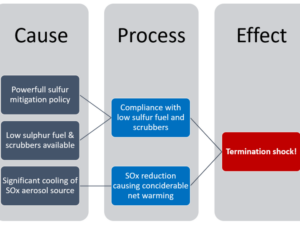The recent pause in carbon pricing for home heating on the East Coast is not the end of the world. However, to avoid a climate-doomsday scenario, we must stay calm and muster the courage and compassion to confront the significant challenges of global heating, affordability, and carbon pricing misinformation. Now more than ever, we must open our eyes and confront the Climate Change Monster evident in shattered temperature records, the epic number of wildfires, and the increasing frequency of extreme weather events. What’s even more concerning is the peer-reviewed paper published today in Oxford Open Climate Change by Dr. James Hansen and others, revealing a more dire situation than previously anticipated, with a significantly larger amount of global warming on the horizon than initially predicted. Carbon pricing hesitation is understandable, as nobody enjoys paying more government fees. But the fact is we get rebates and most of us come out ahead. A helpful analogy is the beer bottle deposit system, which has led to an impressive 97% recycling rate, making it one of Canada’s most successful pollution reduction programs. Canada’s carbon price empowers consumers to make informed choices and unveils what was previously hidden. The rebate offers individuals a means to allocate their money in alignment with making their lives more affordable. Implementing carbon pricing was always going to be a challenging endeavour. We should always aim to enhance it and bear in mind that the IMF reported on October 3, 2023, that countries that rely on subsidies to address the climate crisis risk a debt crisis which puts at risk our social programs. Vital is addressing the lack of commitment from fossil fuel companies and some provinces to reducing emissions. We must cap emissions in the oil and gas sector. We can do this by phasing out the output-based carbon pricing system and introducing carbon border adjustment mechanisms. As well, methane (natural gas)-powered electricity must be removed from the output-based carbon pricing system. These actions would ensure that major polluters pay their fair share and avoid unfairly shifting the burden of decarbonization onto the rest of us. This would also level the playing field and incentivize solar and wind energy. To address broader issues of affordability and the global heating crisis, Canada must undertake significant tax reform. Canadians For Tax Fairness recently released a paper that calls for comprehensive tax reform, which, among many recommendations, praised Canada’s carbon pricing policy. Carbon pricing is a giant leap in the right direction, and it can be made even more effective with the right adjustments. By educating citizens about the rebates, capping emissions, making the big polluters pay, and pursuing comprehensive tax reform, we can tackle the climate monster head-on while ensuring a more affordable future. ### We Must Battle the Climate Change Monster with Carbon Pricing
Undoubtedly, taking climate action will enhance the affordability of our lives. It’s crucial to acknowledge that global heating has already inflicted a staggering cost of $16 million per hour in extreme weather damages over the past two decades, and this situation is deteriorating faster than expected. Carbon pricing stands out as the most effective method to reduce global heating pollution. Happily, carbon pricing coupled with rebates, further improves the affordability of climate action.
Compassion must be part of the journey. Canadians not living on the East Coast perhaps do not know that until this year, home heating oil did not have a carbon price there. As well, for those not living in Canada’s big cities, installing heat pumps as an alternative heating source isn’t always straightforward. Lastly, the recent increase in home heating oil prices on the East Coast led to a misguided response to “sticker shock” on the East Coast. Clean Energy Canada reports that since 2020, costs went up by 12 cents per litre due to the carbon price and 63 cents per litre due to “inflation”.
But why did the sticker shock happen? Canada is dealing with an onslaught of misinformation about carbon pricing propagated through social media which is unaccountable to no one, a sell-out to the almighty dollar and consequently eroding democracies around the world.
Thus, public education must play a critical role. Many Canadians are unaware of the rebates, called Climate Action Incentive, they receive in provinces where federal carbon pricing is in effect. This awareness needs to be raised promptly.
Media Release: We Must Battle the Climate Change Monster with Carbon Pricing
Home » CCL Canada News » Media Release: We Must Battle the Climate Change Monster with Carbon Pricing
Media Release: We Must Battle the Climate Change Monster with Carbon Pricing
Posted on November 2, 2023 in Media Release
FOR IMMEDIATE RELEASE: Thursday, November 2, 2023
MEDIA CONTACT: Cathy Orlando cathy@citizensclimate.org 705-929-4043












